 Petzlover
Petzlover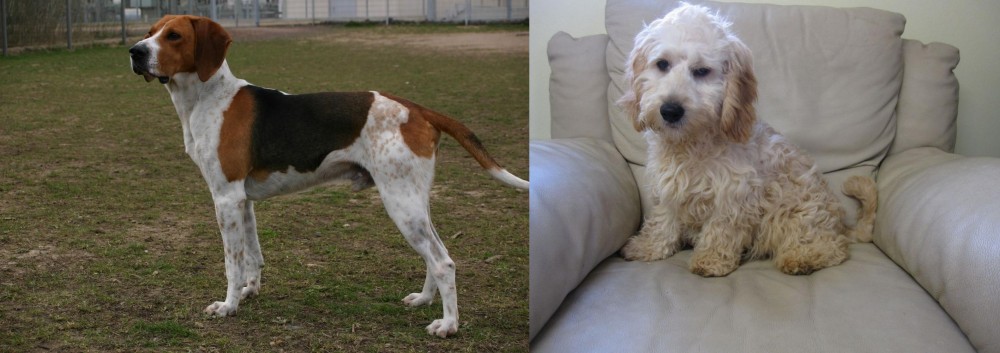 Anglo-Francais de Petite Venerie is originated from France but Cockachon is originated from United States. Anglo-Francais de Petite Venerie may grow 32 cm / 13 inches higher than Cockachon. Anglo-Francais de Petite Venerie may weigh 11 kg / 25 pounds more than Cockachon. Both Anglo-Francais de Petite Venerie and Cockachon has almost same life span. Both Anglo-Francais de Petite Venerie and Cockachon has almost same litter size. Both Anglo-Francais de Petite Venerie and Cockachon requires Low Maintenance.
Anglo-Francais de Petite Venerie is originated from France but Cockachon is originated from United States. Anglo-Francais de Petite Venerie may grow 32 cm / 13 inches higher than Cockachon. Anglo-Francais de Petite Venerie may weigh 11 kg / 25 pounds more than Cockachon. Both Anglo-Francais de Petite Venerie and Cockachon has almost same life span. Both Anglo-Francais de Petite Venerie and Cockachon has almost same litter size. Both Anglo-Francais de Petite Venerie and Cockachon requires Low Maintenance.
 The Anglo-Francais de Petite Venerie is one of the oldest scent hunting dogs around. A crossbreed between the French Hounds and the English hunting dogs, the Anglo-Francais de Petite Venerie is believed to be an offspring of several famous dogs such as the Beagles, the Poitevins, and the Petit Gascon-Sainttongeois.
The Anglo-Francais de Petite Venerie is one of the oldest scent hunting dogs around. A crossbreed between the French Hounds and the English hunting dogs, the Anglo-Francais de Petite Venerie is believed to be an offspring of several famous dogs such as the Beagles, the Poitevins, and the Petit Gascon-Sainttongeois.
Although the genesis of this dog breed is somewhat unclear, a majority of the sources believe that it was developed in the 16th century at a time when written records of dog breeding never existed. Throughout the 16th to the 17th centuries, the Anglo-Francais de Petite Venerie became a treasured dog breed thanks to the rise of hunting games among European nobles. As the sport thrived in England and especially in France, the need to own the Anglo-Francais de Petite Venerie became paramount leading to this dog breed’s popularity. Formerly known as the Petit Anglo-Francais, this dog breed was changed to its current name in 1978 before being admitted to the United Kennel Club in 1996.
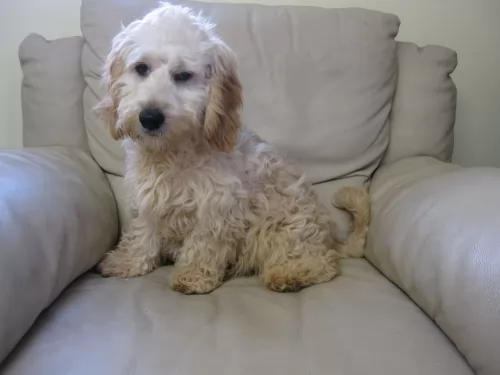 The Cockachon is not a pure bred dog but rather a cross between the Cocker Spaniel and the Bichon Frise. Very little if anything is known about who initially developed the Cockachon. It is known that the International Designer Canine Association (IDCA)registered and recognized the hybrid in 2009.
The Cockachon is not a pure bred dog but rather a cross between the Cocker Spaniel and the Bichon Frise. Very little if anything is known about who initially developed the Cockachon. It is known that the International Designer Canine Association (IDCA)registered and recognized the hybrid in 2009.
It is obviously a relatively new cross breed. The hybrid is also recognized by the American Canine Hybrid Club (ACHC), International Designer Canine Registry (IDCR) and the Designer Dog Kennel Club (DDKC).
 The Anglo-Francais de Petite Venerie is a dog breed that resembles a Beagle. Developed in France, this scent hound has served as a hunting dog for centuries making it an athletic breed with unusual characteristics. Their chests are narrow and deep while the heads are smaller as compared to the rest of the body. The eyes are brown and dark while the tails are medium in size. The limbs are tall, straight, and muscular while their steady necks and broad muzzles are an indication that these dogs are surely bred for hunting purposes.
The Anglo-Francais de Petite Venerie is a dog breed that resembles a Beagle. Developed in France, this scent hound has served as a hunting dog for centuries making it an athletic breed with unusual characteristics. Their chests are narrow and deep while the heads are smaller as compared to the rest of the body. The eyes are brown and dark while the tails are medium in size. The limbs are tall, straight, and muscular while their steady necks and broad muzzles are an indication that these dogs are surely bred for hunting purposes.
Since Anglo-Francais de Petite Venerie are athletic dogs, you will, of course, expect their overall weight to be lesser as compared to most other breeds. These dogs have a short, dense coat that’s easy to groom. With a life expectancy of about 13 years, these breeds are generally healthy and quite easy to maintain. The only major problem these scent hounds experience is a hip and elbow dysplasia which will require you to inspect them for injuries upon returning home from their line of duty.
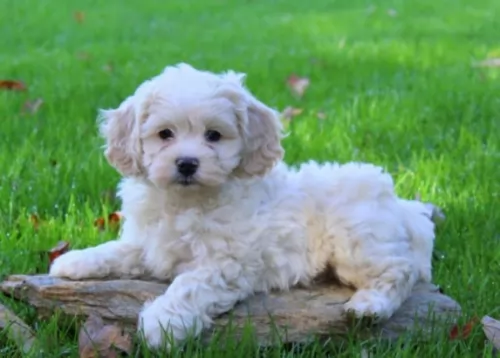 The Cockachon is a cute, little dog very popular in current times. He is small, compact, dark eyes, a round head and black nose. He has a baby face and fluffy hair. It has a furry tail and a blunt muzzle.
The Cockachon is a cute, little dog very popular in current times. He is small, compact, dark eyes, a round head and black nose. He has a baby face and fluffy hair. It has a furry tail and a blunt muzzle.
The Cockachon is a mix between the American Cocker Spaniel and the Bichon Frise. In order to get a better idea of what the hybrid can look like just look at the individual parents. The American Cocker Spaniel is a small dog with a short muzzle and domed head. It is in the Sporting Group, but it is the smallest member of the group. He has a compact, sturdy body and though domed his head is refined.
The Cocker’s stance includes a sloping topline, muscular hindquarters and strong shorter legs adds up to a balanced canine. The coat can be in a wide variety of colors including liver, golden, black, and red. Also, it could be liver and tan, black and tan, roan or tricolors. So, while the Bichon Frise is always white the Cockachon can be any of these colors including white. The types of coats that the Cocker Spaniel and the Bichon Frise have are very different as well.
The Bichon Frise is also a small dog, actually smaller than the American Cocker. The Cockachon usually ends up being about the size of the Bichon at 5-10 kg in weight and 23-30 cm in height. The skull of the Bichon Frise is round rather than domed and the muzzle is also rounded. The tail is long and curly while the Cocker would usually have a cropped tail. The nose and eyes of the Bichon Frise are black and its hair is dense and curly. Unlike the Cocker Spaniel it barely sheds.
Many Cockachon have floppy ears, curly coats and come in any variety of colors though many, many are white.
 Anglo-Francais de Petite Venerie are non-aggressive, stubborn but tolerable dogs that work well with kids. However, proper training and socialization must be conducted to ensure that these dogs don’t cause harm to your kids.
Anglo-Francais de Petite Venerie are non-aggressive, stubborn but tolerable dogs that work well with kids. However, proper training and socialization must be conducted to ensure that these dogs don’t cause harm to your kids.
The Anglo-Francais de Petite Venerie is not a shy pet. These dog breeds do make a perfect companion especially due to their hunting characteristics. They can get along well with new owners and should be kept with a same-breed companion to reduce nervousness.
When it comes to their adaptability, Anglo-Francais de Petite Venerie are better suited to be working dogs over being kept indoors. They are therefore suited to farm settings or rural areas where there’s vast track of lands to play and exercise.
Finally, the Anglo-Francais de Petite Venerie is not suited to everyone. This is because this dog breed is quite stubborn and unable to follow orders like most indoor pets do.
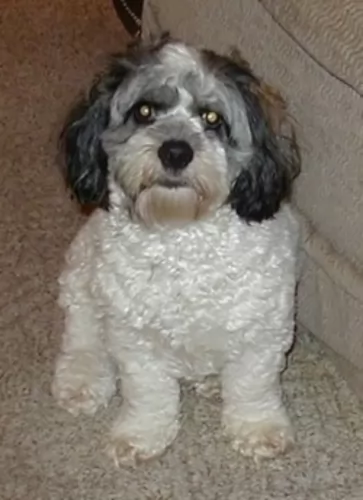 People created the Cockachon to get a small, lap or carry dog that had certain characteristics. These characteristics included a very social, loving dog. He is active and friendly, sweet and gentle. He is loyal, and loves being loved. He is great with other dogs and you can trust him with your children. He is a little independent but very loyal.
People created the Cockachon to get a small, lap or carry dog that had certain characteristics. These characteristics included a very social, loving dog. He is active and friendly, sweet and gentle. He is loyal, and loves being loved. He is great with other dogs and you can trust him with your children. He is a little independent but very loyal.
Like many little dogs he can have serious separation anxiety. Crate training is recommended so that he has a place to feel safe when you are not with him.
 The Anglo-Francais de Petite Venerie is known to be a generally healthy dog with very few health concerns. We think the reason why it’s a healthy dog is due to its athletic characteristic and medium-sized body which is not prone to problems as compared to its large-sized contemporaries. However, since this scent hound is a cross-breed between two well-known breeds, there are chances that it might suffer from several health problems that mostly affect closely related breeds. Some of these health issues include;
The Anglo-Francais de Petite Venerie is known to be a generally healthy dog with very few health concerns. We think the reason why it’s a healthy dog is due to its athletic characteristic and medium-sized body which is not prone to problems as compared to its large-sized contemporaries. However, since this scent hound is a cross-breed between two well-known breeds, there are chances that it might suffer from several health problems that mostly affect closely related breeds. Some of these health issues include;
The hip and elbow dysplasia is a skeletal condition that occurs when the hip or elbow joints fail to develop properly. This condition is very painful and is most common in large breeds such as the St. Bernard, Great Dane, and the German Shepherd. Although the main causes of this condition include; poor nutrition, obesity, lack of exercise, and excessive growth, hereditary issues are very common and can’t be ruled out.
Another health condition you need to watch out for is the demodectic mange. An inflammatory disease caused by various types of mites, the mange can become intolerable in case the number of mites inhabiting your dog’s hair follicles become exorbitant. Among the common signs you’ll expect to see include; redness on the skin, alopecia, and problems with the immune system. To tackle this problem, pet owners will need to groom their dogs more often by digging deep into the skin to identify the mites.
Cataract is a normal eye condition that affects the eye lens causing it to lose its transparency resulting in impaired vision and later blindness. Although this condition is viewed as a byproduct of aging, some dog breeds such as the Anglo-Francais de Petite Venerie are most likely to suffer from this health condition. A common treatment for this condition may include; applying eye drops to help prevent inflammation, surgery or treatment of the underlying factor.
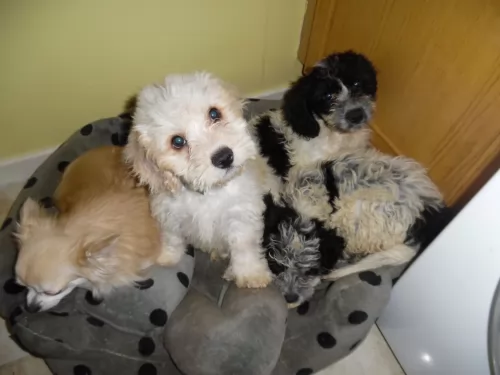 Hybrid dogs seldom have a lot of inherited diseases as they seem to jump a generation but if they do, it can be either a combination of both breeds issues or issues from just one of the breeds in the cross. For the Cockachon these issues include:
Hybrid dogs seldom have a lot of inherited diseases as they seem to jump a generation but if they do, it can be either a combination of both breeds issues or issues from just one of the breeds in the cross. For the Cockachon these issues include:
This loose kneecap issue is common to many small dogs and can cause lameness if not addressed.
Eyelid problems such as the ones that might bother a Cockachon can be found in many small dogs. These include Entropion and Ectropion.
 The Anglo-Francais de Petite Venerie puppies need to be fed with excellent-quality dog food to provide a balanced nutrition for precise growth. For puppies between 8 and 12 months, 4 bowls of food a day will be enough. Puppies ranging from 3 to 6 months old should be given at list 3 meals in 24 hours period. Always feed your puppies with top quality puppy foods to avoid any possible nutritional defects. Dry food mixed with canned food, broth, or water is perfect for puppies.
The Anglo-Francais de Petite Venerie puppies need to be fed with excellent-quality dog food to provide a balanced nutrition for precise growth. For puppies between 8 and 12 months, 4 bowls of food a day will be enough. Puppies ranging from 3 to 6 months old should be given at list 3 meals in 24 hours period. Always feed your puppies with top quality puppy foods to avoid any possible nutritional defects. Dry food mixed with canned food, broth, or water is perfect for puppies.
When your Anglo-Francais de Petite Venerie has reached maturity, it will be best that you feed him once in each day. Always go for the best dog food to ensure that you feed him with proper nutrition. Other meals you can incorporate (but in small quantities) are cooked eggs, fruits, veggies, and cottage cheese.
The Anglo-Francais de Petite Venerie should be fed with excellent-quality food to avoid various health problems such as tooth and bone concerns. Since these breeds are prone to hip dysplasia, regular veterinary check-ups should be observed at all times.
The Anglo-Francais de Petite Venerie is an athletic dog breed that requires regular physical activity to stay in good shape. Following the footsteps of their ancestors, these dogs are hunting dogs despite the fact that some people prefer keeping them indoors as pets. To eliminate boredom, it’s wise that you set aside some time on a daily basis to exercise your dog as well as take a walk down the streets or around the park.
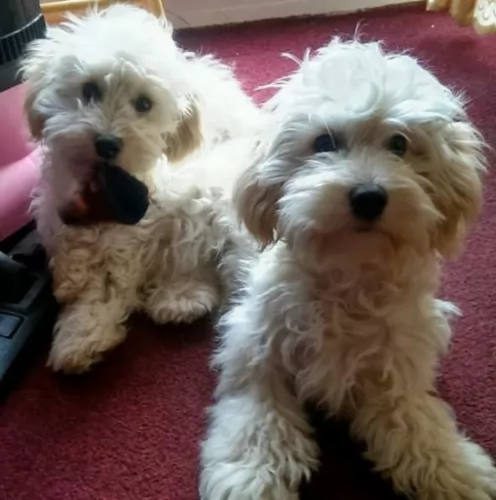 Don’t overfeed a Cockachon. Give him ¾ -1.5 cups of dry food of high quality in two meals per day.
Don’t overfeed a Cockachon. Give him ¾ -1.5 cups of dry food of high quality in two meals per day.
In addition to the issues listed above, the Cockachon is also prone to heart disease and cardiac issues.
The Cockachon has a lot of energy for its size. Make sure it gets plenty of exercise. If walks are the exercise of your choice make sure you walk him for 30 minutes a day. He loves to play, and a back yard would be nice. These little guys do well in obedience but are usually to small for agility.